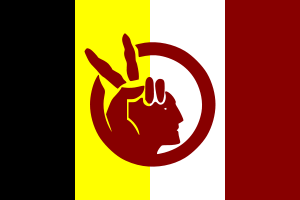From the first contact with their invaders, American Indians have striven to be treated with the respect deserving of an indigenous, sovereign and culturally distinct people. In turn, they’ve faced overt attempts by their conquerors at removal, forced assimilation and genocide. Prior to the arrival of European explorers and settlers in the sixteenth century, the American Indian population was as high as ten million. By 1920, at its lowest point, it had plummeted to less than 300,000. Stripped of all their land, surviving twentieth-century Indians were isolated on remote reservations or urban ghettos, trapped in oppressive poverty with few opportunities for education or employment and virtually no access to health services. Government programmes prohibited them from practicing their ancient traditions. For one hundred years and up until the 1980s, nearly half of all American Indian children were forced from their families and communities and transferred to remote boarding schools – often hundreds of miles from their homes – where they were systematically “deculturated”. This governmental policy was in direct violation of the United Nations 1948 Convention on Punishment and Prevention of the Crime of Genocide, which explicitly prohibits the forced “transfer of the children” of a targeted “racial, ethnical, or religious group”. It was in this milieu of oppression, poverty, disease, overt racism, police brutality, discrimination and hopelessness that the American Indian Movement was founded on this day in 1968.
AIM emerged during the height of anti-Vietnam War activism and the shift in the African American civil rights movement to Black Power. Although there were few formal links between the Red and Black movements, the racial grievances, ethnic pride and political demands of African American activists resonated with the dissatisfactions and resentments of many urban and reservation Indians. At its inception, AIM sought to advance the cause of American Indians by blending civil rights and anti-war protest strategies – marches, demonstrations, occupations and sit-ins – with historic and symbolic targets of Indian resistance. The organisation was catapulted to national attention in November 1972 when its members seized the Washington D.C. headquarters of the Bureau of Indian Affairs in protest of the agency’s discriminatory policies. The following year, a gun battle and 71-day standoff erupted between two hundred AIM members and the FBI at Wounded Knee, South Dakota – the very site of the infamous 1890 massacre and symbolic end of the centuries-long Indian Wars. In 1975, more violence occurred between AIM and the FBI leading to the deaths of two Indians and two FBI agents at the Pine Ridge Reservation. High-profile AIM member Leonard Peltier was convicted in 1977 for the murder of the two federal agents and has become a worldwide symbol of American Indian oppression as he continues to serve a life sentence in prison following a kangaroo court conviction.
Throughout the 1970s, AIM was brutally and relentlessly targeted by the FBI’s nefarious Counter-Intelligence Program and – just like the Black Panthers – the organisation found it difficult to withstand the assault. During the 36-month period beginning with the Wounded Knee standoff, more than sixty AIM members and supporters died violently on or near the Pine Ridge Reservation. At least 342 others suffered violent physical assaults. Unsurprisingly, by 1993, AIM had splintered into two factions. But in Dennis Banks and Russell Means, the movement has produced two of America’s most inspirational activists. Both continue their struggle to hold the United States government to account for its broken treaties and genocidal crimes against American Indians, the degrading and discriminatory use of Indian mascots by athletic teams and to protect and maintain Indian rights. Despite the movement’s many gains, at the onset of the twenty-first century, American Indian reservations still had a poverty rate of 31 percent – six times the national average.
And the American government, meanwhile, continues to expose its total disregard for its ignominious past and utter contempt for its native citizens by slanderously code-naming the operation to kill Osama bin Ladin “Geronimo”.



3 Responses to 28th July 1968 – the Founding of the American Indian Movement